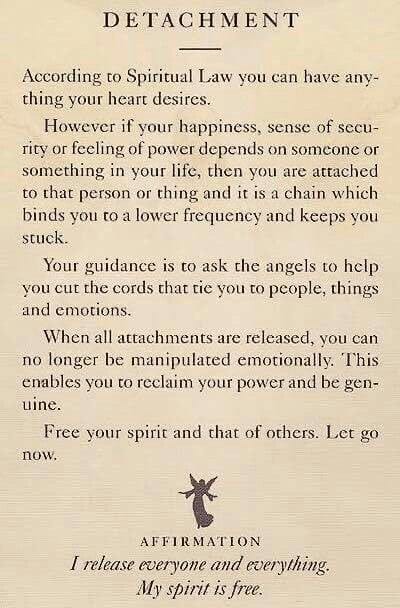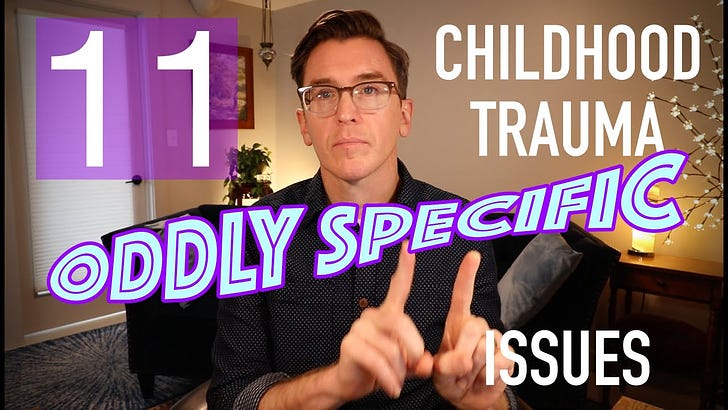Traits that may linger from childhood trauma
...protective as a child in a bad setting but not helpful as an adult
11 Oddly Specific Childhood Trauma Issues. Patrick Teahan, LICSW, (YouTube).
A survivor turned therapist shares what he has seen in his own behavior patterns and feelings and in trauma patients. He has coined some of his own phrases for some of the issues. Labeling a weird feeling can help give someone a little more power over it, better coping skills rather than being impulsively reactive.
Children and adults benefit from talking through their strong emotions as it helps move memories from the more reactive amygdala of the brain into longer term memory storage.
This is such a great video that I am going to summarize - some of it is paraphrased in my interpretation. Good video, listen to it too.
Emotional Delay - tendency to say ‘yes’ in the immediate and then later think, wait a minute, that was too big an ask. Anger or hurt might be later. Patrick thinks this may have to do with hypervigilance - constant anxiety in the present, emotional processing comes later. Therapy ideas - talk more regularly about your feelings with safe people.
Rushing nowhere - rushing through life may be due to feeling like you are living in an emergency. Childhood may have felt like a constant anxious emergency. Hurry up and reach the next goal… never enjoying that you just did get your college degree or did just get a good job or happy marriage. Shame and hypervigilance may be factors, or living in a family who kept secrets or were very religious and any little mistake might lead to shaming. In our adulthood we may still be trying to prevent a disaster that had happened to us as a child. Therapy ideas - work through your fears/anxiety - what is it that you think might happen if you don’t finish this thing this minute/day/week?
Refrigerator Buzz Depression - low level depression is just chronic - is there any other normal? How can you know what ‘happy’ is if you never felt relaxed, happy, and focused on some positive goal? Therapy ideas - process what happened to you - which can hurt. Picking old scabs off and peering at the pain - the depression may feel a little worse before it starts getting better.
Being Tired may be a Trigger - fatigue may be associated with failing. Trauma kids often were neglected and needed to cope with daily care that parents should have provided to that age of a child. Therapy ideas - think about what is negative about feeling tired.
In a TikTok short he discusses perfectionism as possibly having to do with childhood neglect and a need to get yourself organized for everything. (Youtube) My take - perfectionism may also be from perfectionist parents who always had a criticism about how something could be improved. As an adult talking with my mom who has Alzheimer’s now - her pointing out housecleaning tasks to do is her ‘helping’ me. It is also helpful to hear “Good job” occasionally without a “but you missed that tiny speck” - so you failed….
Chameleon, but Don’t Mix - can hang out with different circles of people by acting like them a bit, but mixing those social circles is not done. Compartmentalizing work, social, religious, family - circles potentially out of shame or the role modeling that your parents displayed. It might be about keeping highly critical people away from your other circles. Therapy ideas - again think through (“dialogue with the inner child”) what specifically seems like a risk about introducing friends from different circles of your life.
On the Spot Dissociation - someone may dissociate when being asked a question, or being the center of attention as a presenter or at a party, or a musician that can play well until on a stage with a microphone. Being the center of attention may trigger an anxiety attack and you dissociate/blank out. As a child any attention received may have only or mostly been negative attention.
From my own experience of memory blanks, overstimulation may be part of it. There are photos of a birthday party for me when I was nine and I don’t remember any of it, and I didn’t at age 16 when a friend reminded me of my nine-year-old party when she was at my 16-year-old party.
Laughing about the Pain - jokingly talking about horrific childhood situations - may leave the listener in shock. The inner child may be trying to tell the truth but our outer persona is hardened to it and makes it a joke instead of a sob story. This may occur with a toxic family that also jokes sarcastically and nastily about emotions or vulnerability. Treatment ideas - as you notice this happening, think about it from your origin story and try to feel the real anger or grief about the situation instead of scoffing at your little you.
Crying Valve, Can’t Stop - another way of not processing grief can be crying too much. How can you pick through issues if you can’t stop crying? It may be a cry for help amid the grief. Treatment ideas: EMDR therapy may help, DBT may help as a first step to regain some emotional control and ability to stay present in a conversation rather than dissolving into tears.
My take: Maybe you need to cry for a week or two first. Emotional tears are excreting stress hormones.
Glass Frog - they can all see right through me - social anxiety where you feel like everyone is looking at you or thinking about how bad you are in some way. But - of course, they aren’t. This may be the toddler view of the world knows everything you know. If sneaking around because of abusive parents was a childhood trait, then it may be continuing into adulthood with expecting the boss or others to jump on your case at any minute.
Sideways Grief or Rage - something minor gets the big emotional reaction instead of the real thing we are sad or mad about. Unprocessed issues leave a deep well of suppressed emotions that pop out unexpectedly - the envelop didn’t rip open correctly or gave you a paper cut — melt down. Minor frustrations not being handled well may suggest there are deeper pains to work through. Treatment ideas: find safe people to process these deeper issues with.
Waiting Games - I will do X after Y takes place - “I will give them another chance and see … may be chance number 89 with an abuser.” Parents may have role modeled this behavior. This is an example of Magical Thinking - if I wait for this, then that magical thing will happen. Treatment ideas: the inner child needs to become aware that things can get done by you the adult, even if you aren’t in the perfect mood or energy level or that other ‘Y’ thing hasn’t happened yet. Parenting our inner child with dominant/non dominant handwriting techniques may help.
His take home point - these weird feelings may feel unique to you, but they are pretty common for child trauma survivors and can improve with the mental processing work.
Another point not mentioned - don’t avoid facing the possibility that “child trauma” might be in your own perfect childhood. Children from emotionally neglectful or controlling settings can also develop trauma behavior patterns and it is common for child trauma survivors to say their childhood was perfect/great/no problems. They blanked out the bad stuff. That is what dissociation can do for you besides forgetting an over-stimulating birthday party - it helps you forget the sarcastic name calling, angry loud voices, or other hurts or simply confusing things that were never discussed as a child.
Patrick discusses controlling families without using that word in a Tiktok short: “Repressed people really dislike authenticity…and really circle the wagons around conformity, based on fear. ~You have to like the same sports team, go to the same church, shun the same things.” (Youtube)
Over-Explaining - is an extra point in a Tiktok short (Youtube). Excess detail is given in text or verbally - possibly because little kids do this too. We may feel that we aren’t going to be believed or they won’t get it if we don’t explain thoroughly. Treatment ideas: Less is more. Learn to give the gist and a person can ask for more detail if needed.
It is easier to explain than to change though.
I resemble this list and am still working on improving.

Disclaimer: Opinions are my own and the information is provided for educational purposes within the guidelines of Fair Use. While I am a Registered Dietitian this information is not intended to provide individual health guidance. Please see a functional health professional for individual health care purposes.





This was a brilliant read! As a Childhood Trauma victim, and adult sufferer of CPTSD I understand what you speak of. Peace and love to you